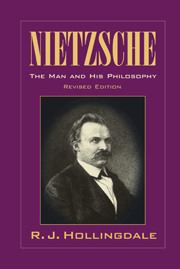2 - The Schoolboy
from Part I - 1844-1869
Published online by Cambridge University Press: 13 September 2019
Summary
Youth is disagreeable: for in youth it is either not possible or not sensible to be productive, in whatever sense. (MA 539)
Pforta was a hard school and a strict one, but it was what Nietzsche required at the age of 14. Like those of most public schools of its time, its regulations read as if they were designed for a prison for persistent offenders, but it is probably a mistake to think them actually harmful to a boy who has to learn somehow that ease and happiness are not the same thing, and may as well learn it from people who have his welfare at heart. He has left us an account of a typical day in Pforta school life. Pupils were woken at 4 a.m. and had to be ready for action by 5; classes started at 6 and continued in one form or another until noon. They resumed at 1:15 p.m. and went on until ten to 4. Further classes were held in the evening, and bedtime was 9 p.m. Behaviour at mealtimes was strictly regulated, and there was little more than an hour during the day when the student was left to his own devices. This routine was followed for five days a week. Sunday was free, and there was one other day on which the boarders could lie in bed an hour longer and then spend their time in revision of the week's work. And there were also, of course, the long school holidays in which to recover. At first Nietzsche disliked this life intensely. He suffered from homesickness: in February 1859, after he had been at Pforta four months, he was prostrated by an overwhelming desire to get away from it and go back home, and he suffered a similar attack on returning from the summer holidays of the same year. He confided his troubles to his tutor, Buddensieg, who helped him to recover, after which he became something of a model scholar, chiefly because he excelled in the subjects the school placed most emphasis on.
The real interest of Pforta lay in Greek and Latin, and to a lesser degree in the German classics.
- Type
- Chapter
- Information
- NietzscheThe Man and His Philosophy Revised Edition, pp. 18 - 27Publisher: Cambridge University PressPrint publication year: 1999



